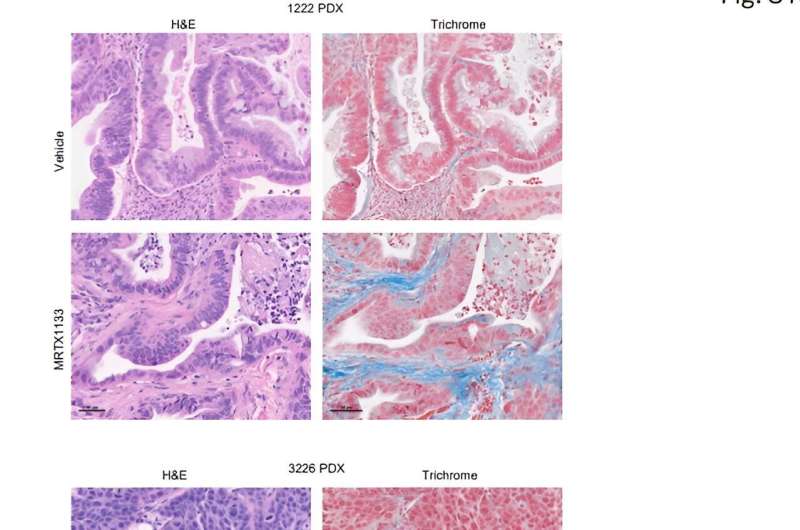This article has been reviewed according to Science X's editorial process and policies. Editors have highlighted the following attributes while ensuring the content's credibility:
fact-checked
proofread
Study defines mechanisms underlying promising precision therapy for pancreatic cancer

A research study led by a multidisciplinary team of scientists at Roswell Park Comprehensive Cancer Center details evidence on the therapeutic efficacy of a compound that targets a key genetic feature of pancreatic cancer. The work, published in Cancer Research, illustrates potential clinical applications for the novel anticancer agent MRTX1133 and outlines its effect on both the tumor and the surrounding environment.
Most pancreatic cancers harbor mutations in the KRAS gene, which drives many of the features that make this disease so lethal. New precision agents have been developed that are selective for KRAS mutations. In this new work, the Roswell Park team explores the utility of a selective inhibitor, MRTX1133, that specifically targets KRASG12D—a mutation present in approximately half of all pancreatic cancers.
Mutation of KRAS is a major molecular driver for the development of pancreatic cancer. MRTX1133, being a selective inhibitor against mutant KRASG12D, possesses antitumor efficacy that is selective for only tumor cells that harbor this mutation—a level of precision targeting that has long been a goal for the treatment of cancer.
The team used a series of laboratory cell lines and preclinical models to illustrate how the tumor itself, as well as the environment surrounding the tumor, is acted upon by MRTX1133 and how both contribute to the therapeutic response.
"Our study highlights the importance of using models that accurately capture the tumor microenvironment," says Vishnu Kumarasamy, Ph.D., the lead author on the new work. "This underscores the critical role of the tumor's surrounding environment in therapeutic response to KRAS inhibition, which should be broadly considered when developing targeted therapies for pancreatic cancer."
To date, immunotherapy has not been highly successful as treatment for pancreatic cancer. However, a key finding of the study was that MRTX1133 reprogrammed the immune system despite only inhibiting KRASG12D present in the tumor itself. In this fashion, the immune system contributed to potent therapeutic response in several of the pancreatic cancer models tested.
"Harnessing the immune system to act against the tumor is likely critical for the success of most cancer therapies. So it was especially exciting to see that pharmacological inhibition of KRAS had such profound effects on different elements of the immune system for which we are still exploring the mechanism," notes study co-author Prasenjit Dey, Ph.D., Associate Professor of Immunology at Roswell Park.
The lack of effective treatments for pancreatic cancer is a major contributor to poor survival rates, and new options are needed for those pancreatic cancer patients whose cancers are not controlled by standard therapies, the authors note. Currently the five-year survival rate for patients diagnosed with the disease in the U.S. is approximately 12%.
"Agents that selectively target features unique to the tumor are critical for precision medicine, where scientific discovery ultimately provides new approaches to care," says study senior author Agnieszka Witkiewicz, MD, Professor of Molecular and Cellular Biology and Director of the Advanced Tissue Imaging Shared Resource at Roswell Park. "Hopefully, such agents will become a much-needed game changer in the fight against pancreatic cancer."
The research team also included Erik Knudsen, Ph.D., Chair of Molecular and Cellular Biology; Ethan Abel, Ph.D., Assistant Professor of Molecular and Cellular Biology; and Costakis Frangou, Ph.D., Assistant Professor of Molecular and Cellular Biology.
More information: Vishnu Kumarasamy et al, The extracellular niche and tumor microenvironment enhance KRAS inhibitor efficacy in pancreatic cancer., Cancer Research (2024). DOI: 10.1158/0008-5472.CAN-23-2504


















